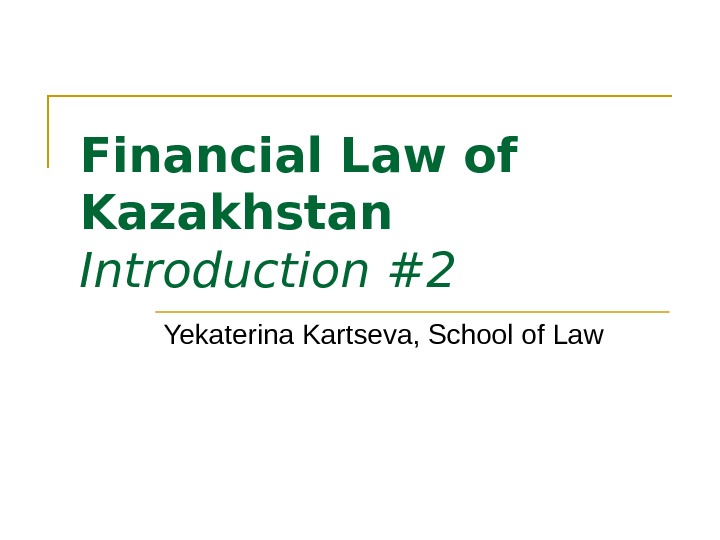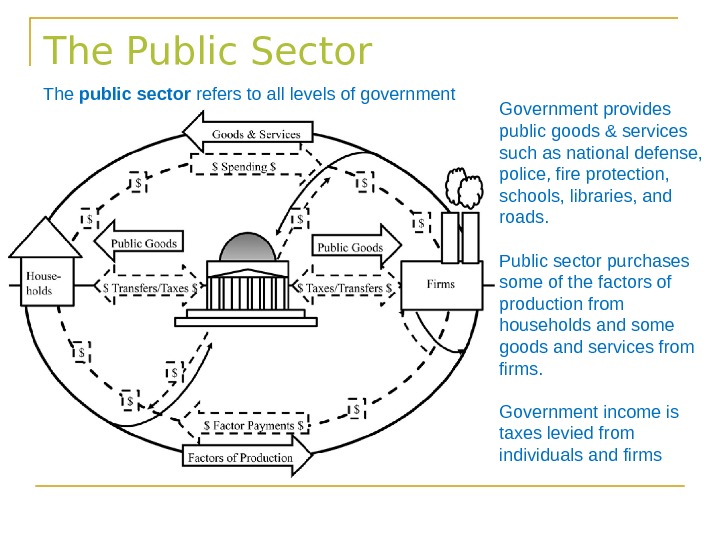Financial Law of Kazakhstan Introduction #2 Yekaterina Kartseva,









2._introduction_to_financial_market.ppt
- Размер: 1.9 Mегабайта
- Количество слайдов: 8
Описание презентации Financial Law of Kazakhstan Introduction #2 Yekaterina Kartseva, по слайдам
 Financial Law of Kazakhstan Introduction #2 Yekaterina Kartseva, School of Law
Financial Law of Kazakhstan Introduction #2 Yekaterina Kartseva, School of Law
 Key objectives I. Understanding the functioning of any Economy II. Understanding the role of financial sector and financial market in the economy
Key objectives I. Understanding the functioning of any Economy II. Understanding the role of financial sector and financial market in the economy
 Plan I. Private Sector II. Public Sector III. Foreign Sector IV. Financial Sector V. Financial Market
Plan I. Private Sector II. Public Sector III. Foreign Sector IV. Financial Sector V. Financial Market
 The Private Sector Players of Private Sector: • Households • Firms Households sell their labor and entrepreneurship to the firms in exchange for wages and profits (Factor Payments) Firms employ land, labor, capital, and entrepreneurship (Factors of Production) in order to provide goods and services
The Private Sector Players of Private Sector: • Households • Firms Households sell their labor and entrepreneurship to the firms in exchange for wages and profits (Factor Payments) Firms employ land, labor, capital, and entrepreneurship (Factors of Production) in order to provide goods and services
 The Public Sector The public sector refers to all levels of government Government provides public goods & services such as national defense, police, fire protection, schools, libraries, and roads. Public sector purchases some of the factors of production from households and some goods and services from firms. Government income is taxes levied from individuals and firms
The Public Sector The public sector refers to all levels of government Government provides public goods & services such as national defense, police, fire protection, schools, libraries, and roads. Public sector purchases some of the factors of production from households and some goods and services from firms. Government income is taxes levied from individuals and firms
 The Foreign Sector The economy does not exist in isolation. The foreign sector refers to the rest of the world. Some of the domestically produced goods and services are exported to other countries. At the same time country imports goods and services from the rest of the world. Factors of Production (labor, land, capital) are also traded between countries in exchange foreign factor payments (if imported) and in exchange foreign income (if exported).
The Foreign Sector The economy does not exist in isolation. The foreign sector refers to the rest of the world. Some of the domestically produced goods and services are exported to other countries. At the same time country imports goods and services from the rest of the world. Factors of Production (labor, land, capital) are also traded between countries in exchange foreign factor payments (if imported) and in exchange foreign income (if exported).
 The Financial Sector The transactions in the product market either involve the use of debit cards, credit cards, cash drawn from ATMs, or in the case of exports and imports, foreign exchange. In the factor market, the story is the same, most citizens receive income not in cash but on debit cards. The financial sector , or intermediaries like banks and stock exchanges, help to facilitate all of the above mentioned transactions.
The Financial Sector The transactions in the product market either involve the use of debit cards, credit cards, cash drawn from ATMs, or in the case of exports and imports, foreign exchange. In the factor market, the story is the same, most citizens receive income not in cash but on debit cards. The financial sector , or intermediaries like banks and stock exchanges, help to facilitate all of the above mentioned transactions.
 The Financial Market Private, public, and foreign sectors don’t only spend money — they also save. Savings flow to financial intermediaries and from there to all sectors of the economy. When households save, they may buy shares of stock, bonds, or certificates of deposit. Government finances its spending in excess of taxes by issuing the various treasury securities. Central bank that links government to the financial intermediaries acts like a heart that pumps money into the economy’s circulatory system.
The Financial Market Private, public, and foreign sectors don’t only spend money — they also save. Savings flow to financial intermediaries and from there to all sectors of the economy. When households save, they may buy shares of stock, bonds, or certificates of deposit. Government finances its spending in excess of taxes by issuing the various treasury securities. Central bank that links government to the financial intermediaries acts like a heart that pumps money into the economy’s circulatory system.

